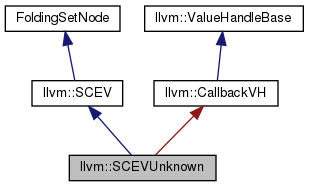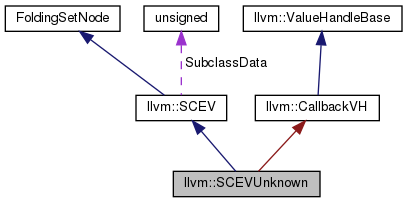This means that we are dealing with an entirely unknown SCEV value, and only represent it as its LLVM Value. More...
#include "llvm/Analysis/ScalarEvolutionExpressions.h"


Public Member Functions | |
| Value * | getValue () const |
| Type * | getType () const |
| bool | isSizeOf (Type *&AllocTy) const |
| bool | isAlignOf (Type *&AllocTy) const |
| bool | isOffsetOf (Type *&STy, Constant *&FieldNo) const |
 Public Member Functions inherited from llvm::SCEV Public Member Functions inherited from llvm::SCEV | |
| SCEV (const FoldingSetNodeIDRef ID, unsigned SCEVTy) | |
| SCEV (const SCEV &)=delete | |
| SCEV & | operator= (const SCEV &)=delete |
| unsigned | getSCEVType () const |
| Type * | getType () const |
| Return the LLVM type of this SCEV expression. More... | |
| bool | isZero () const |
| Return true if the expression is a constant zero. More... | |
| bool | isOne () const |
| Return true if the expression is a constant one. More... | |
| bool | isAllOnesValue () const |
| Return true if the expression is a constant all-ones value. More... | |
| bool | isNonConstantNegative () const |
| Return true if the specified scev is negated, but not a constant. More... | |
| void | print (raw_ostream &OS) const |
| Print out the internal representation of this scalar to the specified stream. More... | |
| void | dump () const |
| This method is used for debugging. More... | |
 Public Member Functions inherited from llvm::FoldingSetBase::Node Public Member Functions inherited from llvm::FoldingSetBase::Node | |
| Node ()=default | |
| void * | getNextInBucket () const |
| void | SetNextInBucket (void *N) |
Static Public Member Functions | |
| static bool | classof (const SCEV *S) |
| Methods for support type inquiry through isa, cast, and dyn_cast: More... | |
Friends | |
| class | ScalarEvolution |
Additional Inherited Members | |
 Public Types inherited from llvm::SCEV Public Types inherited from llvm::SCEV | |
| enum | NoWrapFlags { FlagAnyWrap = 0, FlagNW = (1 << 0), FlagNUW = (1 << 1), FlagNSW = (1 << 2), NoWrapMask = (1 << 3) - 1 } |
| NoWrapFlags are bitfield indices into SubclassData. More... | |
 Protected Attributes inherited from llvm::SCEV Protected Attributes inherited from llvm::SCEV | |
| unsigned short | SubclassData = 0 |
| This field is initialized to zero and may be used in subclasses to store miscellaneous information. More... | |
Detailed Description
This means that we are dealing with an entirely unknown SCEV value, and only represent it as its LLVM Value.
This is the "bottom" value for the analysis.
Definition at line 400 of file ScalarEvolutionExpressions.h.
Member Function Documentation
◆ classof()
Methods for support type inquiry through isa, cast, and dyn_cast:
Definition at line 438 of file ScalarEvolutionExpressions.h.
References llvm::SCEV::getSCEVType(), and llvm::scUnknown.
◆ getType()
|
inline |
Definition at line 435 of file ScalarEvolutionExpressions.h.
Referenced by isSimpleCastedPHI().
◆ getValue()
|
inline |
Definition at line 421 of file ScalarEvolutionExpressions.h.
Referenced by CompareSCEVComplexity(), containsUndefs(), llvm::ScalarEvolution::createAddRecFromPHIWithCasts(), getCastsForInductionPHI(), llvm::ScalarEvolution::getCouldNotCompute(), llvm::getStrideFromPointer(), llvm::ScalarEvolution::getWrapPredicate(), isIntegerLoopHeaderPHI(), llvm::SCEV::print(), PushDefUseChildren(), llvm::SCEVExpander::setChainedPhi(), llvm::ScalarEvolution::verify(), and llvm::SCEVParameterRewriter::visitUnknown().
◆ isAlignOf()
Definition at line 486 of file ScalarEvolution.cpp.
References llvm::SCEVCastExpr::Ty.
Referenced by llvm::SCEV::print().
◆ isOffsetOf()
Definition at line 511 of file ScalarEvolution.cpp.
References llvm::Type::isArrayTy(), llvm::Type::isStructTy(), and llvm::SCEVCastExpr::Ty.
Referenced by llvm::SCEV::print().
◆ isSizeOf()
Test whether this is a special constant representing a type size, alignment, or field offset in a target-independent manner, and hasn't happened to have been folded with other operations into something unrecognizable. This is mainly only useful for pretty-printing and other situations where it isn't absolutely required for these to succeed.
Definition at line 469 of file ScalarEvolution.cpp.
Referenced by llvm::SCEV::print().
Friends And Related Function Documentation
◆ ScalarEvolution
|
friend |
Definition at line 401 of file ScalarEvolutionExpressions.h.
The documentation for this class was generated from the following files:
- include/llvm/Analysis/ScalarEvolutionExpressions.h
- lib/Analysis/ScalarEvolution.cpp
 1.8.13
1.8.13